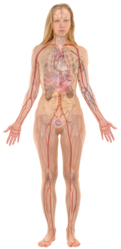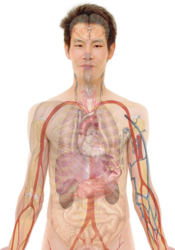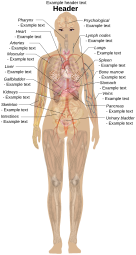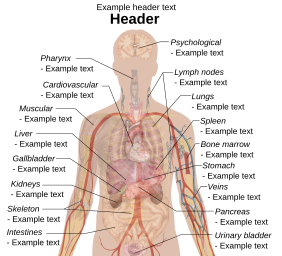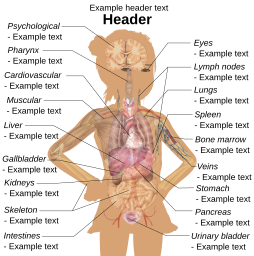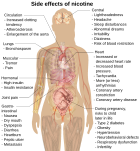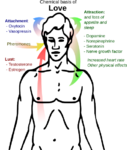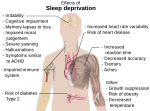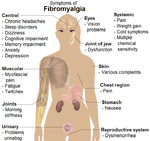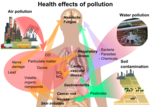File:Female shadow with organs.png

Original file (675 × 1,105 pixels, file size: 621 KB, MIME type: image/png)
Captions
Captions
Contents
Summary
[edit]| DescriptionFemale shadow with organs.png |
English: Image for use in the Human body diagrams project.
To discuss image, please see Talk:Human body diagrams |
| Date | |
| Source | All used images are in public domain. |
| Author | Mikael Häggström |
| Other versions |
 |
Licensing
[edit]| This file is made available under the Creative Commons CC0 1.0 Universal Public Domain Dedication. | |
| The person who associated a work with this deed has dedicated the work to the public domain by waiving all of their rights to the work worldwide under copyright law, including all related and neighboring rights, to the extent allowed by law. You can copy, modify, distribute and perform the work, even for commercial purposes, all without asking permission.
http://creativecommons.org/publicdomain/zero/1.0/deed.enCC0Creative Commons Zero, Public Domain Dedicationfalsefalse |
Human body diagrams[edit]Main article at: Human body diagrams Template location:Template:Human body diagrams How to derive an image[edit]Derive directly from raster image with organs[edit]The raster (.png format) images below have most commonly used organs already included, and text and lines can be added in almost any graphics editor. This is the easiest method, but does not leave any room for customizing what organs are shown. Adding text and lines: Derive "from scratch"[edit]By this method, body diagrams can be derived by pasting organs into one of the "plain" body images shown below. This method requires a graphics editor that can handle transparent images, in order to avoid white squares around the organs when pasting onto the body image. Pictures of organs are found on the project's main page. These were originally adapted to fit the male shadow/silhouette.
Organs:
Derive by vector template[edit]The Vector templates below can be used to derive images with, for example, Inkscape. This is the method with the greatest potential. See Human body diagrams/Inkscape tutorial for a basic description in how to do this.
Examples of derived works[edit]
Licensing[edit]
|
File history
Click on a date/time to view the file as it appeared at that time.
| Date/Time | Thumbnail | Dimensions | User | Comment | |
|---|---|---|---|---|---|
| current | 17:30, 28 January 2012 |  | 675 × 1,105 (621 KB) | Mikael Häggström (talk | contribs) | Adjustment of large vessels |
| 05:38, 25 May 2011 |  | 676 × 1,104 (600 KB) | Mikael Häggström (talk | contribs) | {{Information |Description ={{en|1=d}} |Source ={{own}} |Author =Mikael Häggström |Date =d |Permission = |other_versions = }} |
You cannot overwrite this file.
File usage on Commons
The following page uses this file:
Metadata
This file contains additional information such as Exif metadata which may have been added by the digital camera, scanner, or software program used to create or digitize it. If the file has been modified from its original state, some details such as the timestamp may not fully reflect those of the original file. The timestamp is only as accurate as the clock in the camera, and it may be completely wrong.
| Horizontal resolution | 35.43 dpc |
|---|---|
| Vertical resolution | 35.43 dpc |
| Software used |
